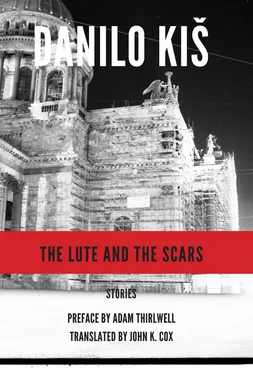Mr. Ličina was as silent and meek as a wet poodle. Disappointed, no doubt.
“I’m asking you nicely: do we have an understanding?”
“That’s fine, sir.”
“Well now. Good. You can go. Oh yeah, I almost forgot. Your bitch had puppies. Six of them about yea big (shows him with his hands), like bear cubs.”
Mr. Ličina said nothing, his head hung low.
Projević: What’s up? You aren’t satisfied with that?
Mr. Ličina: But it was a male!
Projević: A male, you say. I thought it was a bitch. Well then, I’ve gotten it mixed up. So somebody else’s bitch had puppies.
In September Projević showed the poem to some important people in the Party. A number of them said: outstanding. The rest shrugged their shoulders: for no real reason.
Projević (drinking his lozovača ): Cheers, comrades.
Everyone: Cheers!
Projević: So, Comrade Ćićko, this means you don’t like it.
Ćićko: But I didn’t say anything.
This conversation was taking place in the office of the prison warden. It was a kind of inspection. Between colleagues.
Projević: A traitor wrote this. An enemy of the people.
Ćićko: The one Budišić arrested?
Projević: Yes, that one.
A pause ensued. Then they began talking about Budišić.
Projević: I’ll show you all the variants. Seven, eight of them. Each one better than the last. I just think it’s a shame that Budišić didn’t keep that first one.
Ćićko: It’s a pity.
Projević: I’ll show them all to you.
Ćićko: Sit down and stop acting like a child.
Projević took a seat.
They had another glass. And then another.
Projević: How about I bring him to you? So you can see how he recites.
Ćićko: Bring him.
He was delivered to them.
Mr. Ličina was squeezing his cap in his hand. They offered him a brandy. He thanked them.
Projević: Go on, recite the final version. So Comrade Ćićko can hear you.
Ćićko: Go on, go on. Don’t be stuck up. If you were able to write like that. See, I give you my word: if the poem is good — we’ll release you. But make it pretty.
Projević: Like last time.
Mr. Ličina started reciting his sonnet in the manner of the actors at the recent performance for prisoners. Or so his recitation seemed to him. He raised his arms to the heavens (the ceiling), laid his hand over his heart, and took a bow when he finished. He all but curtsied.
Projević looked at Comrade Ćićko. Then he said:
“You’re free.”
And they released him.
Mr. Ličina signed the certificate of release and the confirmation that he had retrieved his personal effects: his suit, watch, fountain pen, hat, shirt, underwear, vest, tie, raincoat, handkerchief, riding breeches, socks, shoes (low-heeled, yellow, size 37), ring of keys.
The guard accompanied him to the prison gate.
Mr. Ličina walked toward the city on foot. It was raining and the wind tore the foliage from the poplars. Leaves whirled up and around, like leaflets tossed from a plane.
A bit before nine he reached his home. He called out his dog’s name: Lunja! Lunja!
The dog didn’t respond.
When Mr. Ličina opened the door to the apartment, the reek of stagnant air greeted him. He ran his finger through the dust on his desk. The top of it gaped bare; his typewriter had been confiscated.
Then, without taking off his coat, he started up the water heater in the bathroom. While the water was warming up, he started to dust in the other room.
He checked the water with his finger, and then he got undressed and stepped into the water that was warm, almost hot.
He took a long bath, huffing and puffing, and almost broke out in song. (But people would have heard him. Auntie Mara had seen him going into the building.) Then he rubbed himself dry using a clean towel that he took off a stack of ironed linens in the cabinet.
He held his shaving soap in his left hand, and with his right he spread the foam over his face, making very slow circles, reminiscent of a tango. Then he squirted a great deal of cologne into his palm and rubbed it in, first on his face and then on his chest, where an old man’s white hairs protruded. Lastly he puffed his cheeks up like a gargoyle and patted them with lotion-covered hands. His dry skin soaked up the moisturizer like the desiccated earth sucks in water.
Then he slowly put on his clothes, all of them clean and fresh. (Though everything smelled slightly of mothballs and uncirculated air.) Underwear, undershirt, shirt. Fresh pants (he took only the suspenders from the old pair), a fresh waistcoat and suit jacket. Clean socks, knee-high. He wiped the dust from his shoes with an old handkerchief.
Then he beheld his appearance once more in the mirror.
He tossed the damp towel from the clothesline into the bathroom, unhooked one end of the line and then jerked the other free of the wall together with its nail. He spread some newspaper ( Politika ) over a chair; it had been in his bathroom since before his arrest. Then he tied the cord to the hook from which the light fixture hung, and placed the noose around his neck. And he shoved the chair away with his foot.
After a few “terrifying days,” things unexpectedly calmed down in the morning. The doctor knew that this calm was only illusory and provisional; he knew that inside this sick human organism certain changes were taking place, changes whose nature was entirely unknown to science and that depended on God as much as on the complicated mechanisms of the organs and psyche. The sick man lay on his back, buoyed lightly by pillows; a monitor tracked the steady beating of his heart. His body was hooked up by tubes to complicated instruments that, for one, flashed how his organs were functioning onto a screen; in addition they ensured that he was artificially fed, and they eased the work of his exhausted veins, bowels, and respiratory system. In the peace of the bright white room only the quiet hum of this machine was audible, along with the occasional tinkling of glass pipes when the sick man moved his limbs even a little. For a while the patient looked up at the bottle suspended above his head, the bottle from which dripped the fluid transmitting life-giving sustenance, by means of a clear tube, into his body.
His staring eyes had dimmed a bit, and he was cross-eyed too, in the manner of people who usually wear glasses but have taken them off.
All was still, to look at him from a remove.
Slowly the drops fell from the bottle; they welled up and then slid suddenly into the tube. And just as one drop was flowing down along the clear piece of tubing toward his body, the next drop had already begun to blossom. The sick man lay observing these drops. They served as a kind of rosary. The idea came to him, struck a part of his consciousness, that the hour of his death was drawing near. Behind him lay a life that was no better and no worse than other lives; he had loved, suffered, traveled, and written. Many people thought, and had said as much in articles, especially after his eightieth birthday, that his life had been filled with work and solitude. But no one knew the price of this work, in terms of renunciation, or how it was as forced as it was beneficial. He recalled, “as if through a foggy mist” (as a refined stylist he certainly never would have used this phrase), that he had been through some terrible crises in recent days, that he had resisted death with all his might, that he had avoided its clutches, that he had torn the tubes out of his veins and spit into death’s face, and that he had wept as he struggled with the phantom of death that was invisible but present; sometimes it stood by his bed and sometimes it was inside him, in his intestines, in his lungs, and in his feverish mind.
Читать дальше












